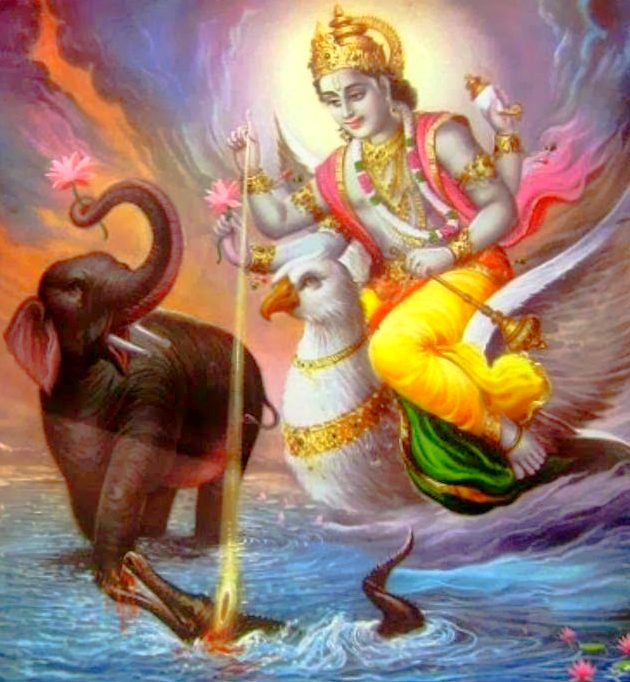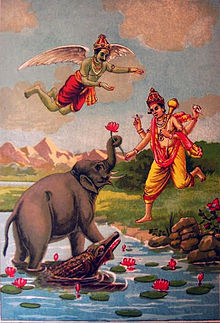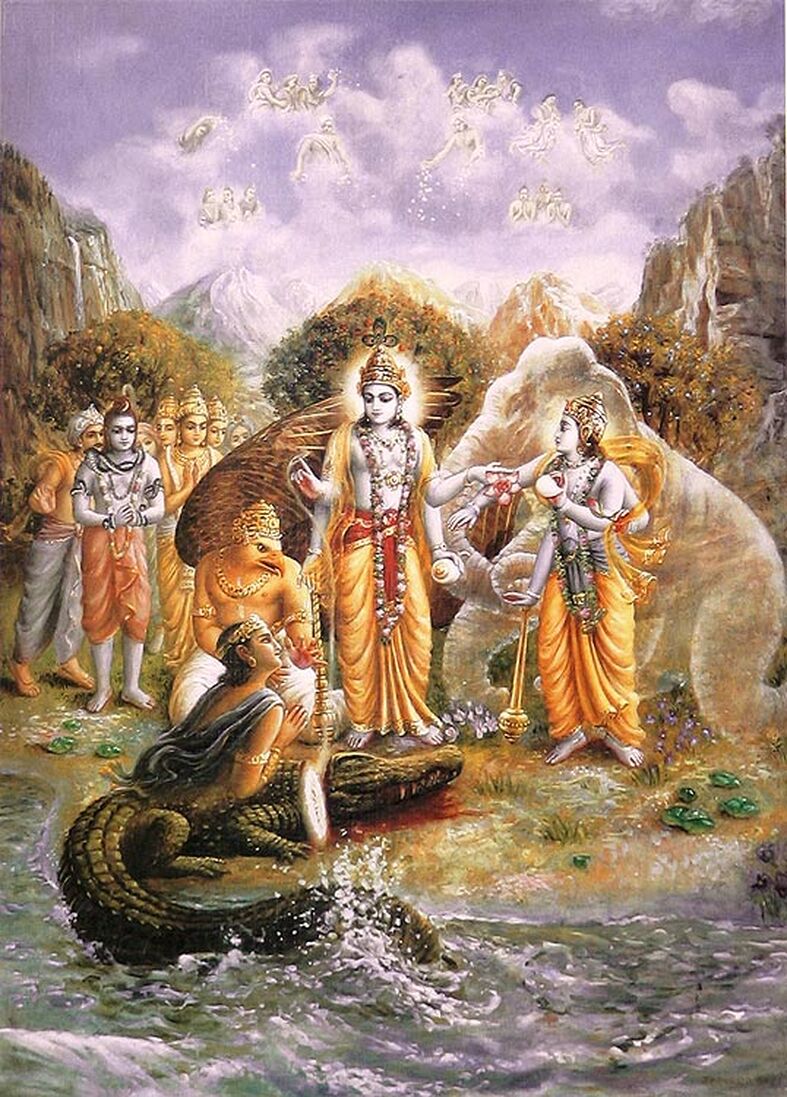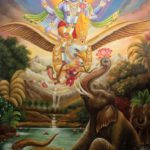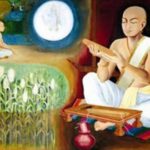The following Post is based on the Translation of Professor T.S.B. Narasaraju garu
Continuing Andhra Cultural Portal’s Spotlight on Telugu Literature is a wonderful work based on one of the most beloved texts in Telugu Poetry.
Having showcased excerpts of his Dasama Skandha we are honoured to present an excerpt of the Ashtama Skandha of Pothana’s Bhagathava Purana, translated into English by Professor T.S.B. Narasaraju. The Eight Canto focuses on the famous pauranic episode Gajendra Moksham.
Book
Below we provide an excerpt from Part I of T.S.B. Narasaraju garu’s book:
Ashtama Skandha of Potana’s Bhagavata Purana.
It is a translation into English of the 8th Canto of Pothana’s Telugu rendition of the Bhagavatha Puraana. On request of Professor Narasaraju, we have attached his translation of the Ashtama Skandhamu, which can be downloaded at the end of the article. Here is the Dasama Skandhamu available for download:
Click here to download Part I of the English Translation of Potana’s Bhagavata Purana (Dasama Skandha)
Without further ado, here are selected excerpts from the new book.
[Excerpt. Some emphasis ours.]
Copyright: T.S.B.Narasaraju. All rights reserved. 2020.
ASHTAMA SKANDHA OF POTANA`S BHAGAVATA PURANA
Thus the elephant and the crocodile fought with each other with self-confidence. Their battle turned out to be dreadful to the on-lookers of all the Lokas. They created turmoil in the lake each with a determination to vanquish the other. Their battle became severe in the waters of the lake comparable to the fight between two lions or an encounter between two mountains dashing against each other. The spectacle of dragging inside and outside of the lake and mutual tossing-up of the opponent sideward continued unperturbed and unabated generating loud sounds of formation and bursting of air-bubbles accompanied by intense foaming and frothing touching the sky.
…
The fight gradually developed into a long-drawn affair spreading over days and nights with the contestants foregoing food and sleep (55). The valour exhibited by Gajendra involving swiftness and tenacity in his fight inside the waters of the lake looked as if it drove suddenly the Karkata and Meena Rasis on the sky inside the solar system (56). Gajendra decided to confuse the crocodile, the latter dragging him frequently into the waters in an attempt to vanquish him.
The strength of the crocodile had an ascendency, water being his natural abode, while the energy of the wrestling Gajaraju deteriorated comparable to the moon of the Krishnapaksha of the month (60, 61). Making fearful sounds, the crocodile-king jumped to attack the skull of the elephant the way a lion does. He could intrude into the space between the legs of the elephant moving round and round tormenting the opponent by biting his neck and back. He could cause lacerations on the tail of the elephant by jumping up easily. He dashed against the elephant inflicting blind-injuries on the body, sinking in water while drowning his tormentor. Incessant attacks from strategic positions caused fractures to the bones of the elephant accompanied by splintering of the tusks (62). Hiding in water, he prevented attempts of the elephant to escape to the shore through timely encounters obstructing the movement of the legs of the latter. The elephant was made immobile getting crumbled down with fear by repeated smashing of his body by the tail of the crocodile. Attempts by the elephant to get up were averted by the timely attacks of the crocodile caused by brisk movement of his body jumping into the air. He tormented the elephant by moving back and forth and attacking ferociously (63).
He caused astonishment to the fellow-crocodiles through his superior valour. He tormented the elephant king in several ways by going under water, floating and jumping up. He gradually enhanced his qualities of fighting overcoming those of the elephant like the darkness of Mahamaya getting the upper hand over the dim light of limited knowledge (64). The crocodile went under the surface of water, kept two of his legs on the bottom-ground of the lake, held his breath standstill and grasped the feet of Gajendra immobilizing them, a process similar to that of a great Yogi attaining god-realisation.
A superior Yogi keeps the dominance of sense organs-under his control, promotes his power of discrimination and derives bliss of touching the feet of the lord (65). Devendra’s elephant, Iravata saw Gajendra being chased by the crocodile. He was so much bewildered that he toppled Devendra from his back and ran helter-skelter on the sky escaping from being caught by Devatas (66). A conscious human being, engrossed in the process of fighting for survival being tied down by the bondage of ignorance, becomes direction-less devoid of superior intellect of decision-making. He fails to wriggle out. Gajendra found himself in such a pitiable situation emaciated, with feet entangled by the sharp fangs of a fierce crocodile (67). Thus the elephant fought with the crocodile for several years incessantly during nights, days and transitions of nights and days untiringly, without fainting due to exhaustion and without foregoing patience (68, 69). Having fought with the crocodile so long, the elephant got totally incapacitated.
Through introspection the elephant started comparing his strength with that of his opponent. He became sad and concluded that he was no match to overcome the might of the crocodile. He felt that it was futile to entertain the wish of conquering his opponent by building castles in the air. Consequent upon the wealth of wisdom resulting from the virtues of his past births, he entertained the following altered thoughts in his mind (70):- “How can I win over this opponent? The name of which god should I bring to my mind? Whom can I call? Who can come to my rescue? Who is capable of overcoming this mighty opponent? Are there no great virtuous people with versatile capabilities to listen to the woes of helpless persons? I salute to such people (71). I got the adoration of several groups of elephants in the forest. I am the leader of several millions of elephants. Instead of staying in the shade of sandal-wood trees brought up by water given by me, why should I come here hoping to get water? Oh! Iswara! I am terrified. I am ignorant about my fate (72).
“Evvaniche janinchu; Jagamevvani lopalanundu leenamai;
Evvani yandu dindu; Barameswaru devvadu; Mula karanam
Bevva; danadhimadhyalayu devvadu; Sarvamu Danayayana va
Devvadu vani natmabhavu Neeswarune saranambu vededan.”(73)
I seek protection from the supreme ruler of the universe, who is responsible for its genesis, in whom it exists getting ultimately amalgamated with him, who is the supreme being considered as soul of the universe being its root-cause, who transcends the processes of birth, existence and death and who is all-pervading being the primordial Atma permeating in all (73). I beg him who does alternatively both the bringing out from himself and taking back to himself of the Lokas. He stays as a witness of the entire gamut of events. He is spotlessly pure. He is the root-cause being the genesis of all creation (74).
“Lokambulu lokesulu, lokasthulu deginatudi nalokambagu
Penjeekatikavvala nevvam, dekakruti velugu natanine sevintun (75).”
I worship exclusively him alone who shines resplendent as a single entity transcending the encompassing void of pitch darkness emerging after the annihilation of all the Lokas, their rulers and inhabitants (75). I praise him who behaves as an actor playfully assuming several forms. Praising his glory is beyond the competence of even Rishis and Devatas. None is able to comprehend his behaviour (76).
Click here to download the English Translation of Potana’s Bhagavata Purana (Ashtama Skandha)
Disclaimer: This book represents the opinions of Author, and should not be considered a reflection of the views of Andhra Cultural Portal. The author is responsible for ensuring the factual veracity of the content, herein.
Copyright: T.S.B.Narasaraju. All rights reserved. 2021.
